From 2 to 4 May 2023, End Water Poverty and our members joined over 700 activists and change leaders in water, sanitation, climate change and social justice in the Hague, in the Netherlands, for the #AllSystemsConnect2023 symposium – a global gathering hosted by IRC, Water for People and Water for Good to find practical ways to advance universal access to safe water and sanitation services.

End Water Poverty convened the social justice events at the symposium and many of our members were involved in key panel and plenary discussions. We highlighted the need to dismantle the power structures that exclude rights-holders, collectively demand #WaterJustice through democratic and sustainable partnerships, and the importance of foregrounding the agency of those most affected by a lack of safe water and sanitation.
As former UN Special Rapporteur on rights to water and sanitation Catarina de Albuquerque stated in her opening address, which was read out on the first day of the conference: “Systems built on inequality such as race and patriarchy must be constantly dismantled and challenged. That is why we are here.”
Highlights from the conference included the screening of the #HearingTheUnheardHRWS short film, the launch of our latest report that documents three years of water rights claiming through the #ClaimYourWaterRights campaign, and a variety of powerful panel discussions with our members. Read more about these highlights below!
Read more about the conference
Decolonising the WASH narrative
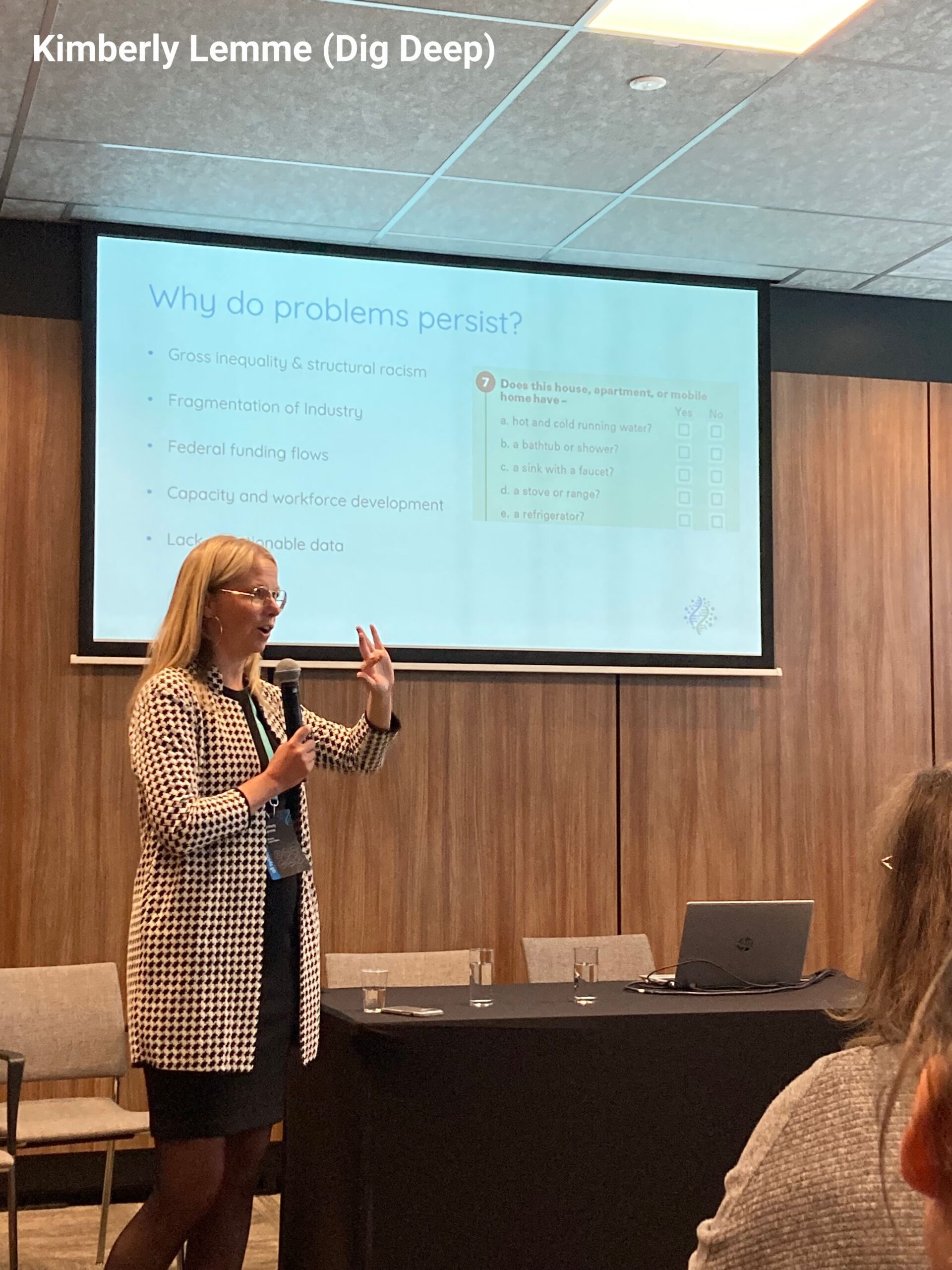 On the first day of the symposium, EWP global coordinator Alana Potter and Dig Deep’s Kimberly Lemme and Kabir Thatte presented on a panel on “decolonising the WASH narrative”, which considered how we can challenge common WASH narratives and use information differently to build stronger partnerships and advance the human rights to water and sanitation.
On the first day of the symposium, EWP global coordinator Alana Potter and Dig Deep’s Kimberly Lemme and Kabir Thatte presented on a panel on “decolonising the WASH narrative”, which considered how we can challenge common WASH narratives and use information differently to build stronger partnerships and advance the human rights to water and sanitation.
“If we’re really serious about decolonising the WASH sector,” EWP’s Alana Potter said, “we need to recognise that we (international NGOs) are part of the problem. We’re sitting on the resources, while grassroots civil society are on the frontlines of the struggle for water and sanitation. We need to start handing over the resources.”
Potter said that people directly affected by poor water and sanitation, climate injustice and environmental degradation are best suited to design, develop and deliver rights-claiming strategies and advocacy campaigns that are uniquely adapted to their local contexts.
For Kimberly Lemme and Kabir Thatte from End Water Poverty’s member organisation Dig Deep, an essential part of decolonising the WASH narrative is recognising that countries in the Global North have not achieved universal access to safe water and sanitation yet and that these countries have a lot to learn from countries in the Global South. “Over 2 million people in the USA still do not have access to safe water and sanitation,” said Lemme. “Why is that? Gross inequality, racism, fragmentation in industry, capacity and lack of actionable data.”
Access the panel presentations
Sanitation workers deserve dignity, safe working conditions and adequate compensation
In various panel discussions and plenary discussions, End Water Poverty’s member organisations highlighted the importance of improving working conditions for sanitation workers and promoting access to safe water and sanitation to precarious workers, such as informal traders and waste reclaimers.
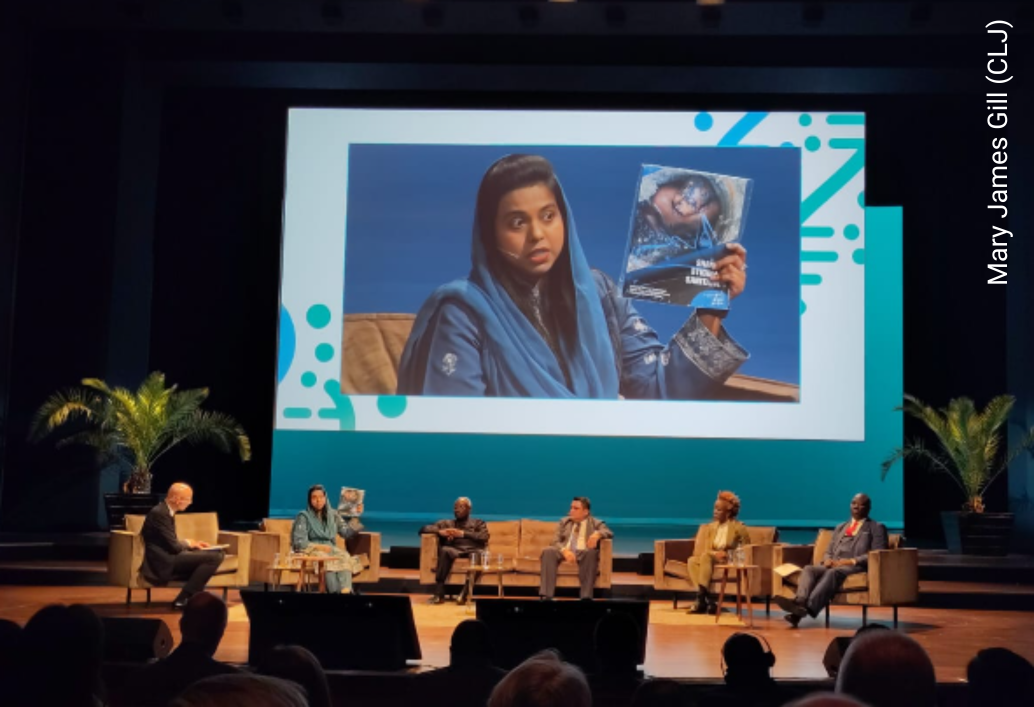
In the plenary discussion on the second day of the symposium, Mary James Gill from the Center for Law and Justice (CLJ) spoke passionately about the plight of sanitation workers in Pakistan who are discriminated on the basis of caste and religion. In Pakistan, sanitation work is considered “low status” and is mainly carried out by descendants of the Hindu Dalit caste, who converted to Christianity generations ago. Over 80% of sanitation workers in Pakistan are Christian (despite making up only 2% of the population). “Despite the essential service they perform,” Gill said, “sanitation workers are forced to work without personal protective equipment (PPE), without medical insurance and sufficient healthcare, and are often working for very low daily wages.”
“People don’t consider that the cost to sanitation workers is a cost to humans – real humans,” Gill continued. “They’re not ‘resources’ or ‘human capital’; they’re people who deserve dignity.” While discussing CLJ’s #SweepersAreSuperheroes campaign, she outlined practical changes that could improve the lives of sanitation workers. “First, recognise them and destigmatise the essential work they perform – no society can survive without sanitation workers. Second, ensure adequate compensation and protection for them. Third, invest in them by giving them training and a platform to speak.”
“Sanitation workers might have to clean up other people’s shit, but they deserve dignity, and they must be honoured and respected.”
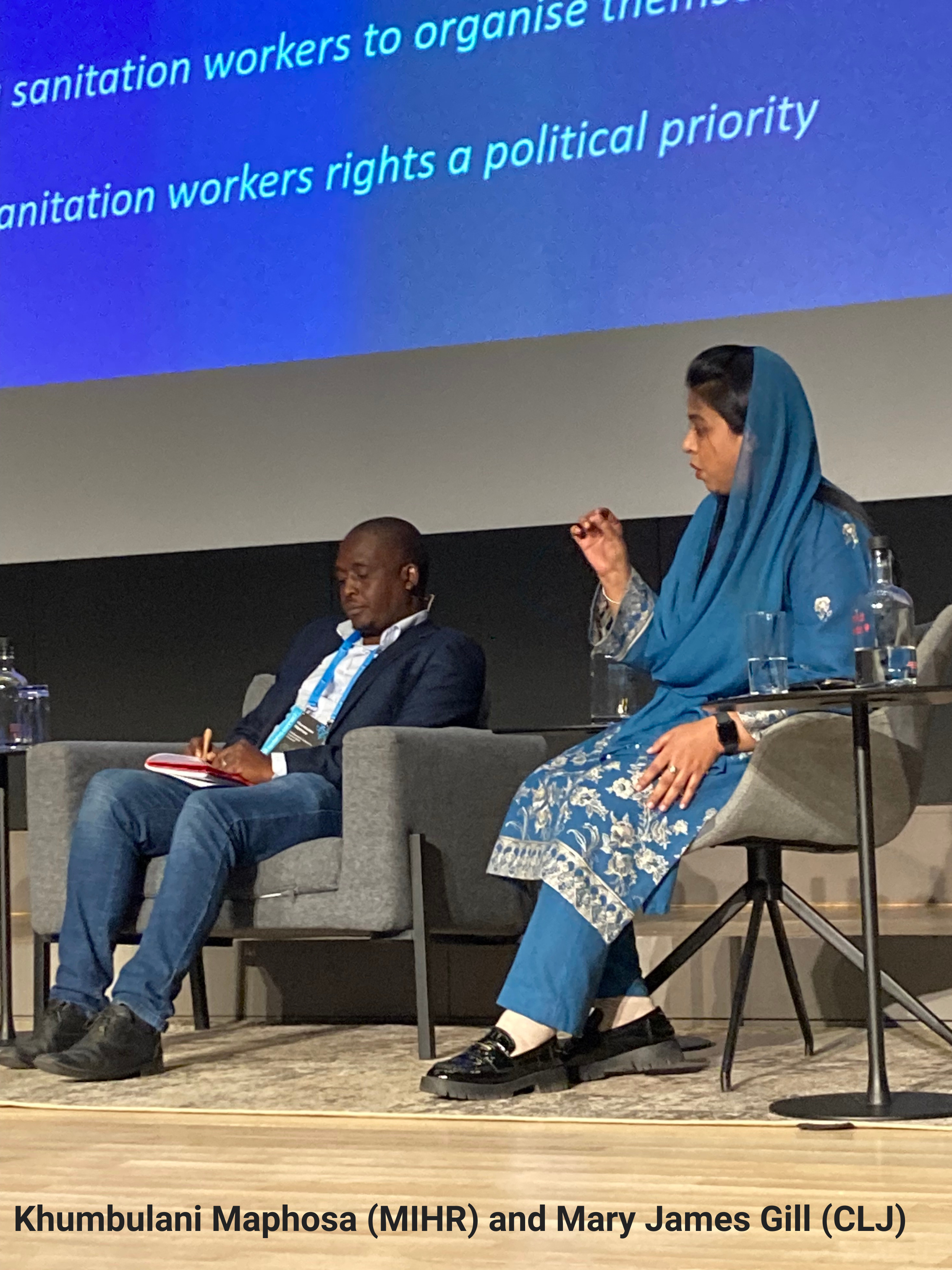 On the third day of the conference, Gill joined Khumbulani Maphosa from the Matabeleland Institute for Human Rights (MIHR) and Kelebogile Khunou from the Socio-Economic Rights Institute of South Africa (SERI) on a panel on claiming the right to decent work and make a living. The panel focused on the experiences of precarious workers, such as sanitation workers, waste reclaimers and informal traders, and their struggles to access safe water and sanitation.
On the third day of the conference, Gill joined Khumbulani Maphosa from the Matabeleland Institute for Human Rights (MIHR) and Kelebogile Khunou from the Socio-Economic Rights Institute of South Africa (SERI) on a panel on claiming the right to decent work and make a living. The panel focused on the experiences of precarious workers, such as sanitation workers, waste reclaimers and informal traders, and their struggles to access safe water and sanitation.
The speakers underscored how the regulatory systems often exclude or criminalise precarious and informal workers. Street vendors, sanitation workers and waste reclaimers play a vital role in countries’ economies, recycle hundreds of thousands of tons of solid waste, and provide affordable food, goods, and services and yet they work in hazardous and exploitative working conditions and have no access to sanitation, protective equipment, decent working conditions, and critically, safe water for personal hygiene, drinking, and food preparation.
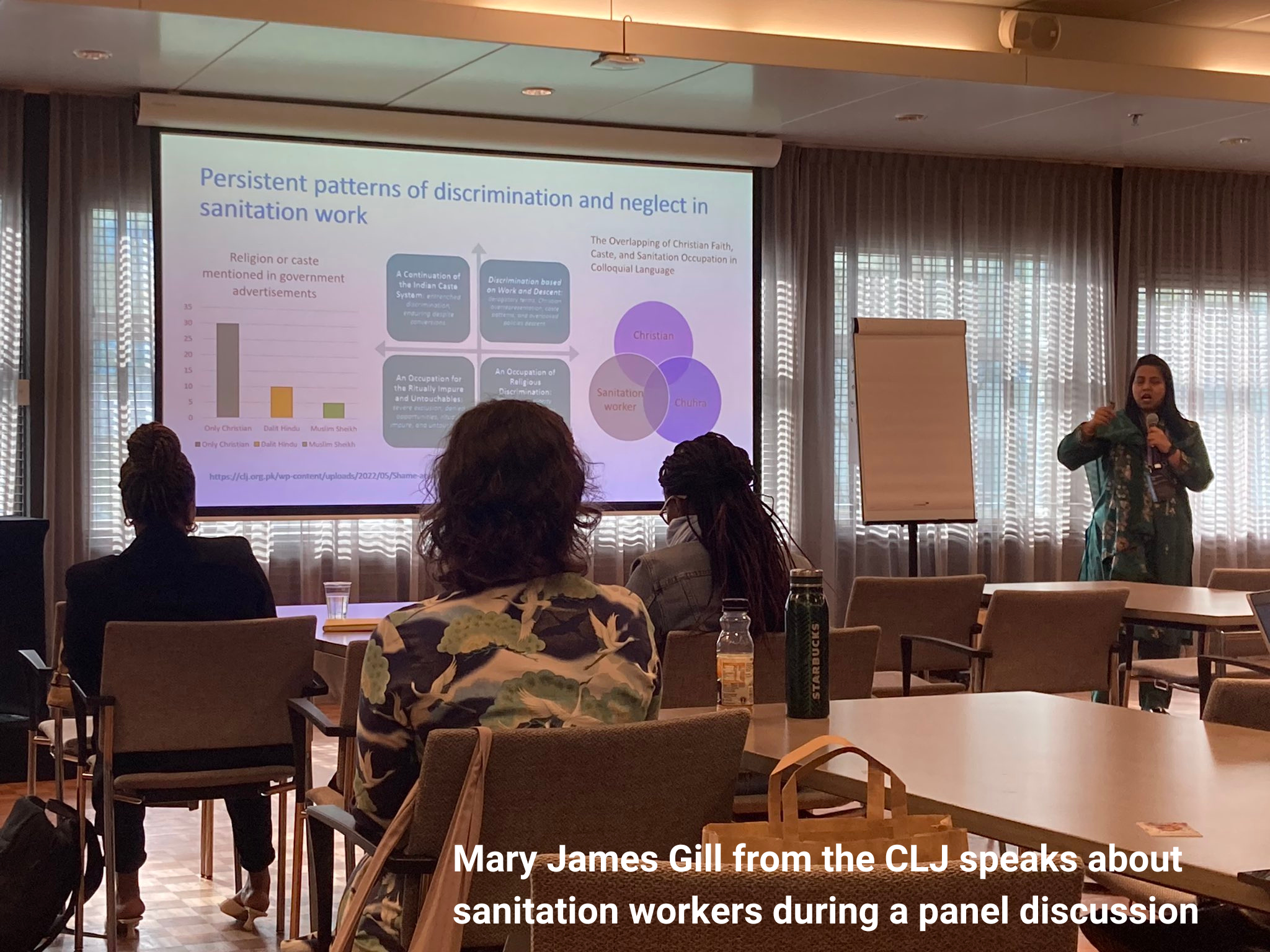 As Khunou noted, in the context of informal traders in South Africa: “Without access to water and sanitation facilities, the hygiene and health of informal traders and their customers could be compromised.” This is a public health and food security issue.
As Khunou noted, in the context of informal traders in South Africa: “Without access to water and sanitation facilities, the hygiene and health of informal traders and their customers could be compromised.” This is a public health and food security issue.
“We need to make precarious workers and their work visible,” said Maphosa. “By humanising them, making their work and working conditions visible, and increasing their entrepreneurial profiles, we can support water reclaimers’ agency.”
Gill added that participatory processes can improve precarious workers’ working conditions and water and sanitation systems as a whole. “Bringing sanitation workers into the design of the sanitation process – not just at a token inclusion – but facilitating meaningful participation,” said Gill, “will lead to better and more dignified sanitation systems.”
Access the panel presentations
Creative rights-claiming: Community activists reflect on their strategies, tactics & lessons learnt
On 3 May 2023, End Water Poverty brought together seven activists and human rights defenders from across the world that are claiming their rights to water, sanitation, housing and the environment in a panel to discuss the diverse range of strategies and tactics they have used to promote accountability and influence change.
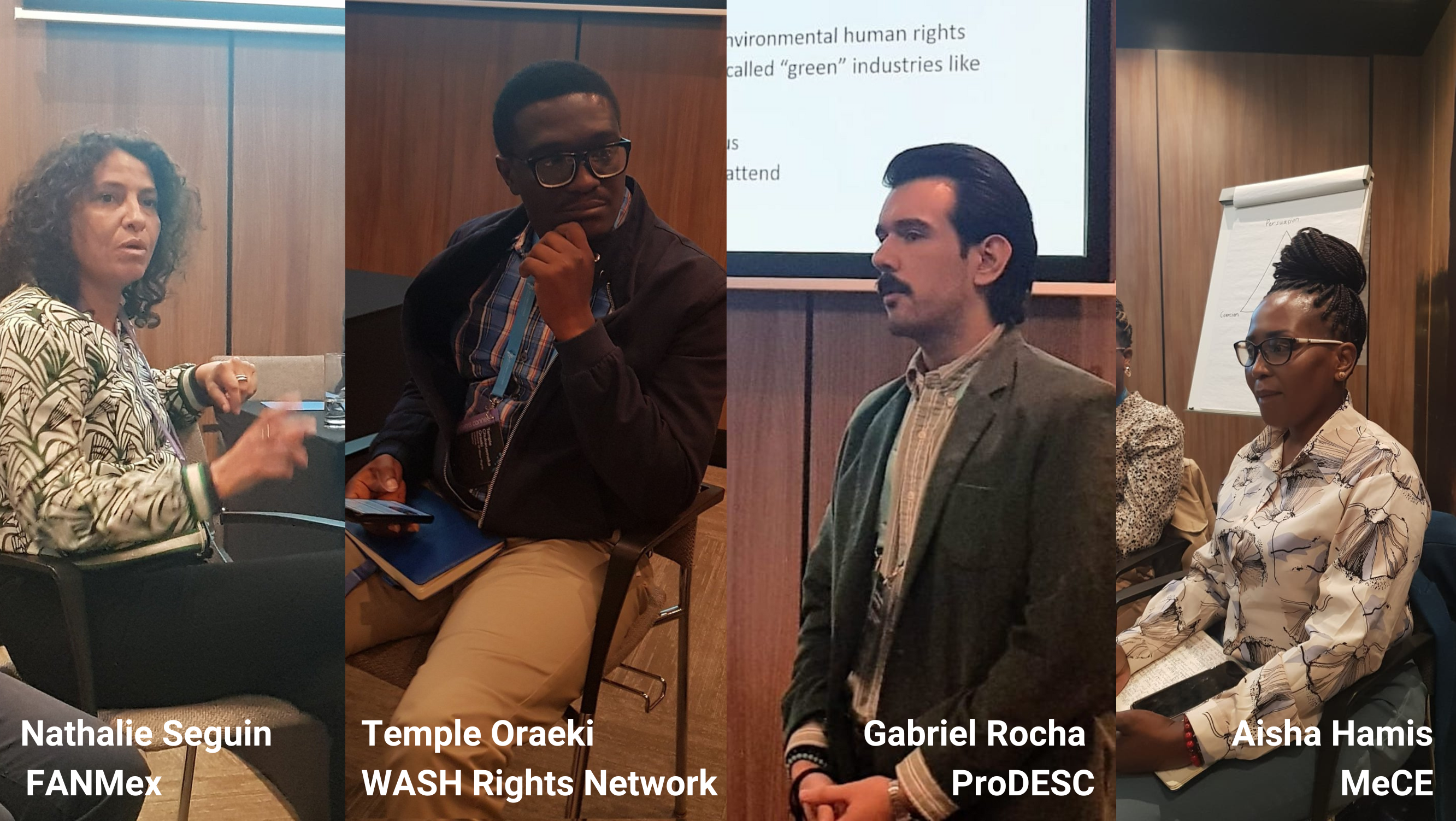
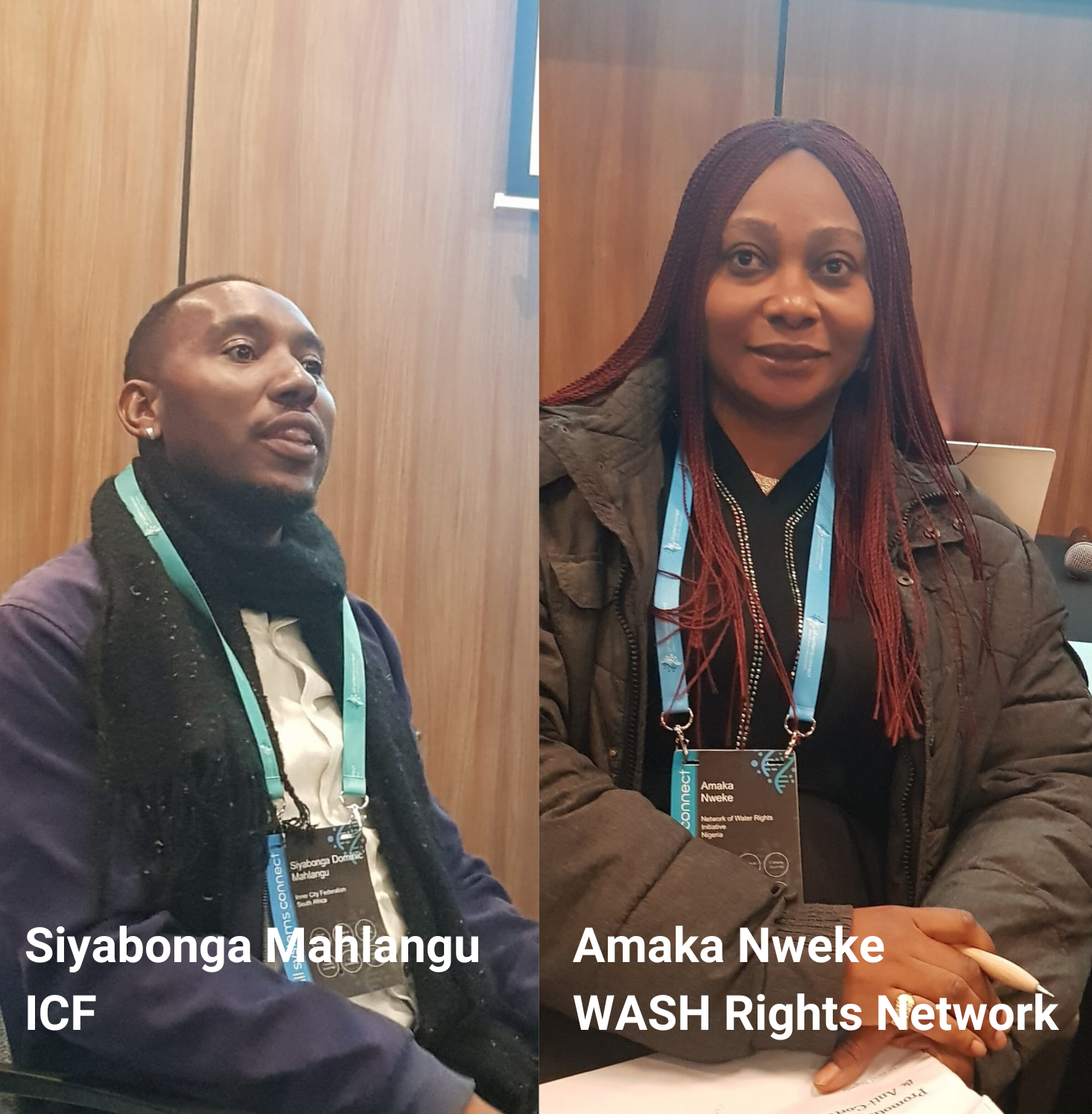 The aim of the multi-disciplinary panel was to encourage learning and exchange across different sectors. The panel consisted of:
The aim of the multi-disciplinary panel was to encourage learning and exchange across different sectors. The panel consisted of:
- Nathalie Seguin from FANMex and Redes del Agua, who shared how FANMex had analysed thousands of official documents on the levels of harmful pollutants to expose water contamination in schools in México.
- Aisha Hamis from Media for Community Engagement (MeCE), who spoke about the power of community radio to amplify the experiences of marginalised communities in Tanzania. MeCE’s radio programmes have reached more than 11 million people across Tanzania and led to several local authorities installing boreholes and committing funds to improving services.
- Thobeka Gumede from the Centre for Environmental Rights (CER), who explained how CER uses a mix of community mobilisation and litigation to promote the right to a safe environment in South Africa. She also spoke about how CER uses share-holder advocacy to hold corporations accountable for their environmental rights violations.
- Temple Oraeki and Amaka Nweke from the Network for Water Rights Initiative (WASH Rights Network), who spoke about their experiences lobbying for pro-poor policy and legislative changes in Nigeria including the right to water in the Egunu Water Bill and the state of disaster declared in Enugu State as a result of the water and sanitation crisis. They also shared their experiences in building local communities’ capacity.
- Siyabonga Mahlangu from the Inner City Federation (ICF), who explained how they created a self-organising coalition of tenants and unlawful occupiers from over 40 (abandoned) buildings in inner-city Johannesburg in South Africa, and assist poor communities to represent themselves in court to resist evictions and illegal water disconnections.
- Gabriel Gustavo Rocha Belloni from Proyecto de Derechos Económicos, Sociales y Culturales (ProDESC), who shared how ProDESC assists human rights defenders that face the threat of violence, intimidation and repression to develop community-based security protocols.
The key take away from the panel was that contextually-sensitive strategies are most effective. The three main points arising from the panel were that community activists need resources to sustain their struggles; the freedom to use strategic opportunities when they arise; and the flexibility to be innovative and responsive to dynamic environments.
Many of the panellists’ work is documented in End Water Poverty’s latest research report.
Access the panel presentations
Read our report on #ClaimYourWaterRights
Where and how does gender strengthen WASH systems?
On 2 May 2023, Helen Pankhurst from CARE International moderated a social justice panel discussion on how including women in decision-making processes not only strengthens water and sanitation systems, but also promotes justice and equity.
The session, which featured Aisha Hamis from Media for Community Engagement (MeCE), was packed with success stories where working with women and men at community and government levels positively affected decision-making and priorities that influence WASH budgets and WASH systems. Ultimately the discussion highlighted the importance of the WASH sector linking more fully with women’s empowerment initiatives to multiply impact.
Access the panel presentations
Key takeaways
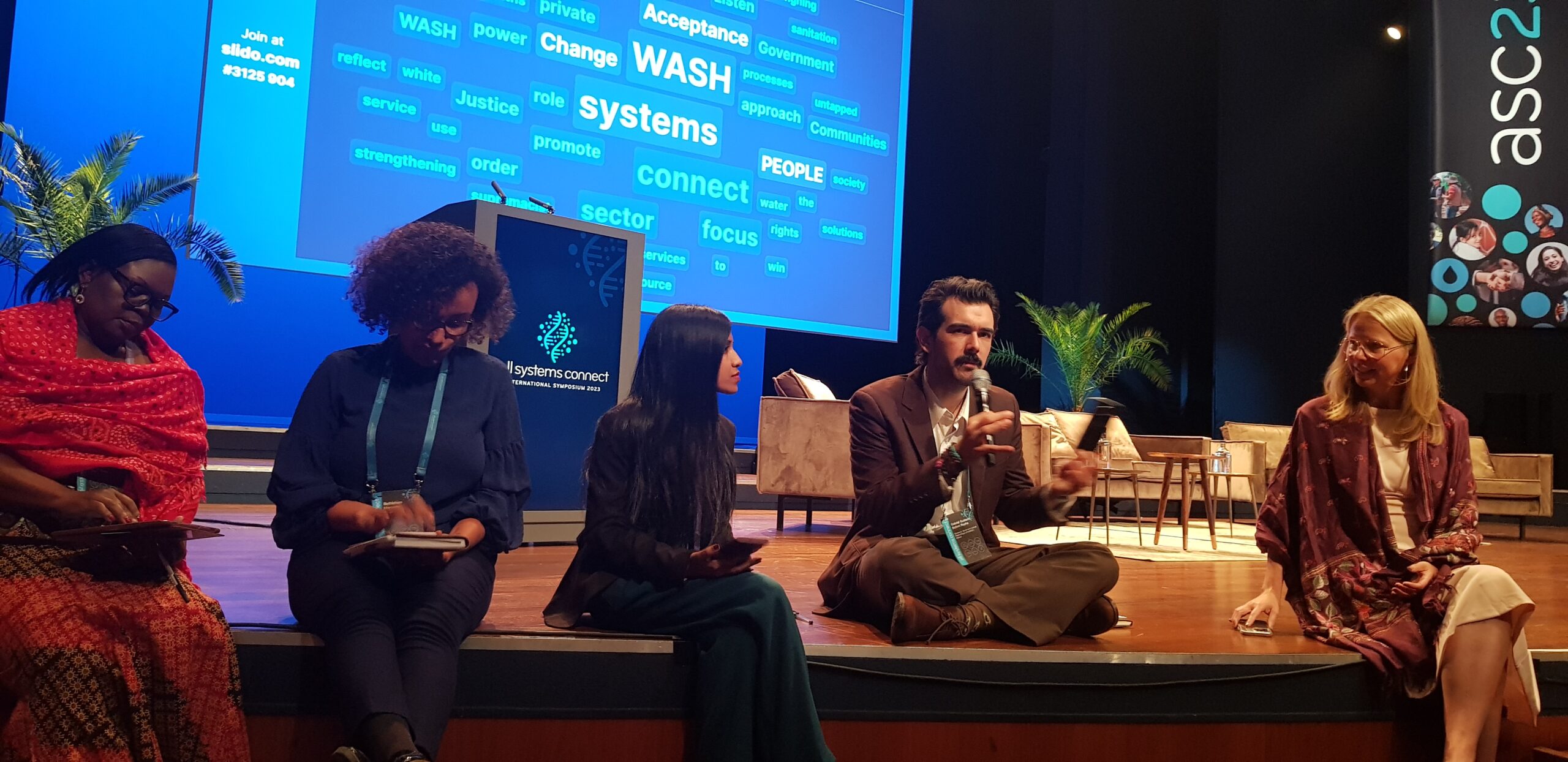 The culmination of the conference was a social justice action assembly, during which activists and change leaders identified the primary challenges to socially just water and sanitation, and what collective actions should be prioritised to overcome these challenges.
The culmination of the conference was a social justice action assembly, during which activists and change leaders identified the primary challenges to socially just water and sanitation, and what collective actions should be prioritised to overcome these challenges.
To structure this conversation, a social justice wisdom council comprised of experts in the field of social justice summarised the key debates and discussions arising from the social justice sessions at the conference. Here are the three key takeaways from wisdom council member Gabriel Gustavo Rocha Belloni:
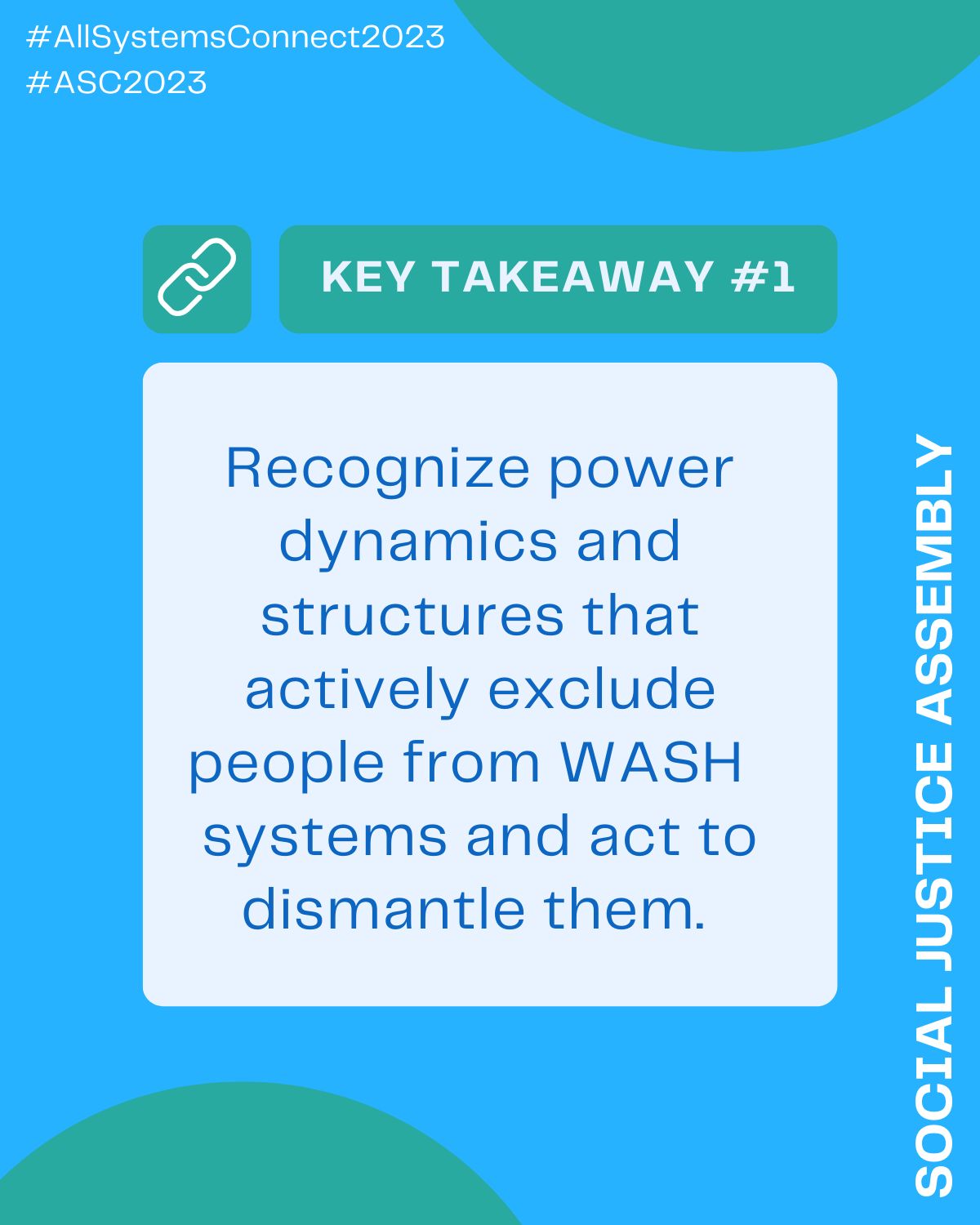
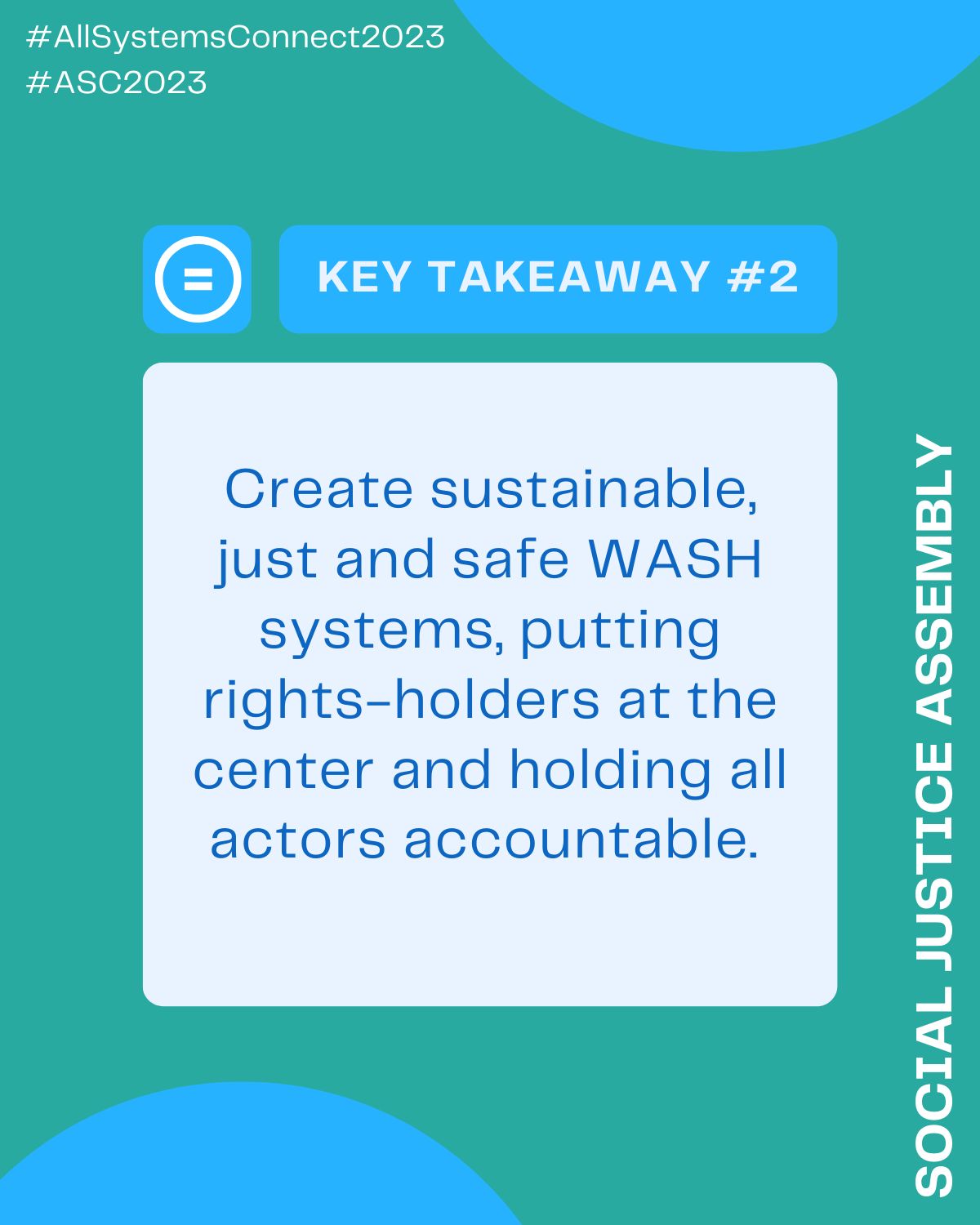
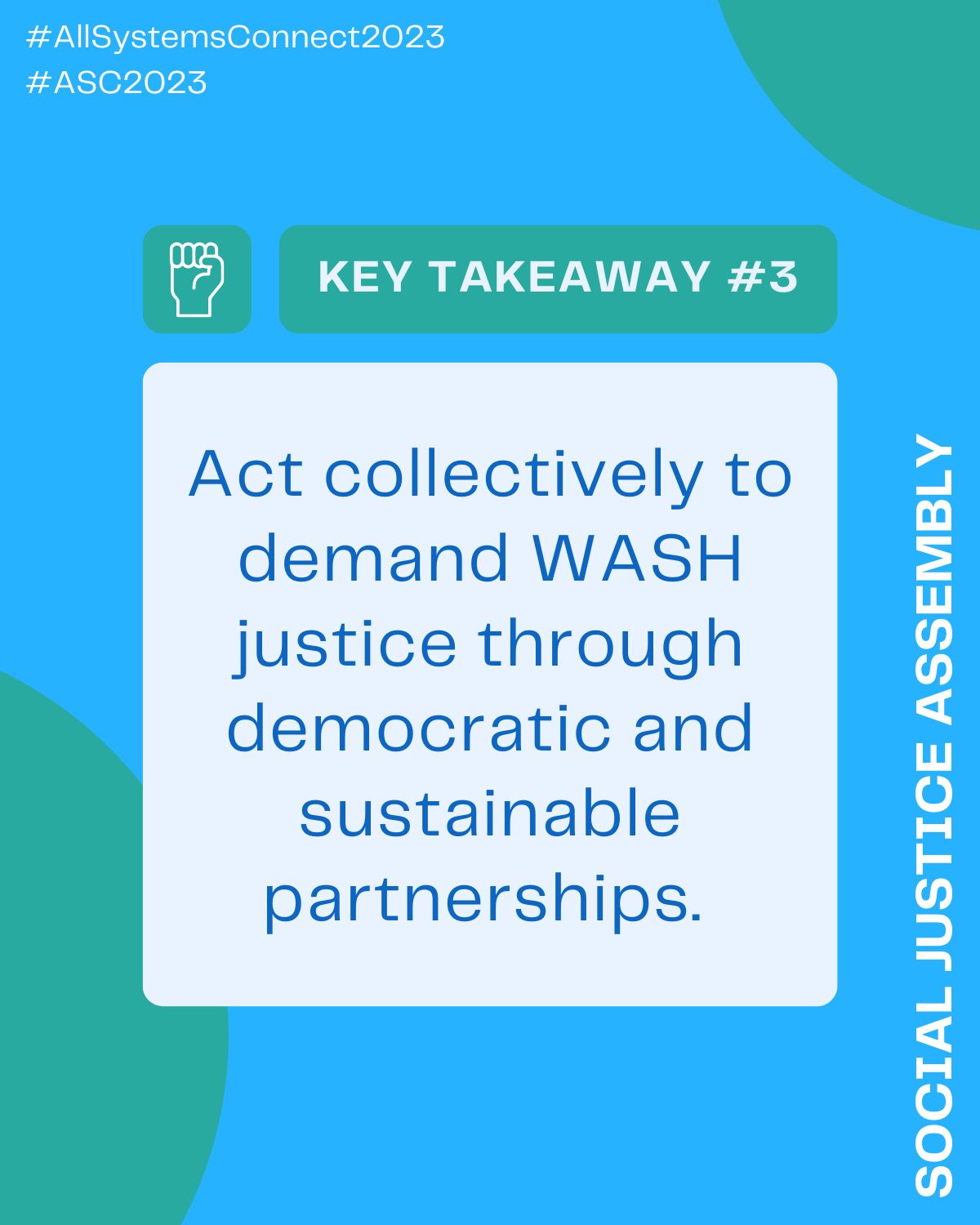
“People are not marginalised accidentally,” said End Water Poverty global coordinator Alana Potter, while articulating the main challenges. “They are actively excluded by systems of power, and so some systems need to be disconnected and de-powered!”
Social justice is about action. In our actions, we need to challenge the norms, regulations and practices that keep groups of people at the margins. The way we support all communities to realise their rights to safe water and sanitation will determine whether social justice outcomes are achieved. As Potter said: “Civil society is not only registered NGOs – it includes social movements, workers and communities claiming their rights – and we are all operating in increasingly restricted civic spaces.”
To overcome these challenges, the assembly agreed to prioritise the following actions:
- Put right-holders front and centre, and dismantle the systems that maintain their marginalisation.
- Ensure that access to safe water and sanitation is not subject to a person’s legality, formality or documentation.
- Challenge discrimination – on the basis of gender, race, class, geography or other grounds – by exposing it, prioritising the most vulnerable, & justly compensating those who’s access to safe water and sanitation is eroded.
True systems leadership challenges oppressive power. It stops the silence and marginalisation. It co-creates the rights realisation agendas of all groups, building on their participation and actions to secure access to safe water, sanitation, housing, livelihoods, and an environment not harmful to their health.
End Water Poverty and our members’ work is closely aligned with this progressive agenda.